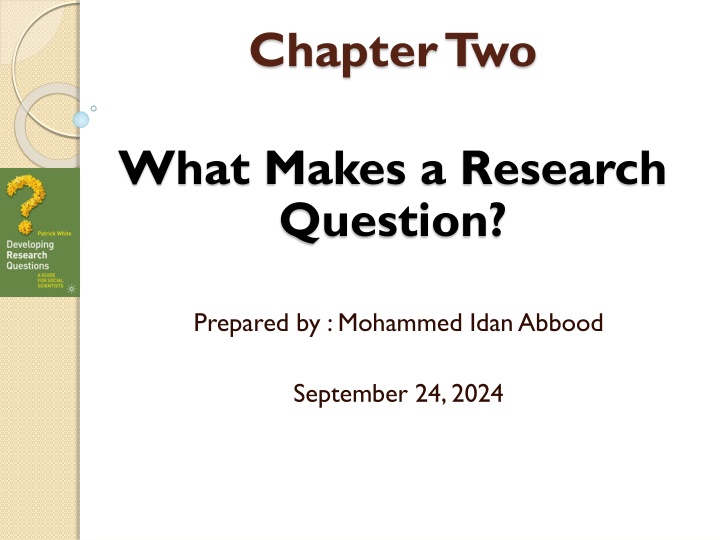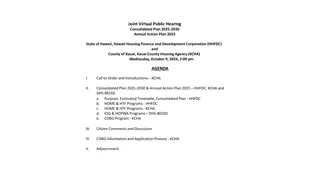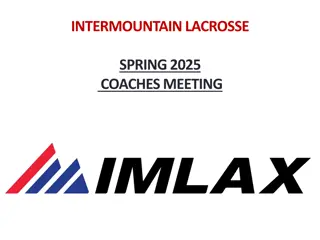
Importance of Clear Research Questions
Explore the significance of formulating clear and precise research questions when embarking on a research journey. Learn why clear questions are essential, how they provide direction, and the pitfalls of vague inquiries. Clear questions save time, avoid irrelevant information, and guide research effectively.
Download Presentation

Please find below an Image/Link to download the presentation.
The content on the website is provided AS IS for your information and personal use only. It may not be sold, licensed, or shared on other websites without obtaining consent from the author. If you encounter any issues during the download, it is possible that the publisher has removed the file from their server.
You are allowed to download the files provided on this website for personal or commercial use, subject to the condition that they are used lawfully. All files are the property of their respective owners.
The content on the website is provided AS IS for your information and personal use only. It may not be sold, licensed, or shared on other websites without obtaining consent from the author.
E N D
Presentation Transcript
Chapter Two What Makes a Research Question? Prepared by : Mohammed IdanAbbood September 24, 2024
Overview of Chapter Two In this chapter, the author, Patrick White, offers an overview of questions, especially in the sector of social science. He explains why some questions are easier to research than others and the best approaches to use in developing focused and precise research questions. Further, He discusses in some extent the importance of hypotheses in the research process.
The Outline of Chapter Two Patrick White, the author, divides this chapter into six sections: 1. Research topics, aims, and objectives 2. The form of questions and their content 3. Question types 4. Hypotheses 5. Summary 6. Further reading
1. Research Topics, Aims, and Objectives In this section, Patrick White highlights the need to transform from general area of research to specific research objectives. Aims and objectives provide more direction than topics do and can help you start thinking. Research questions provide a clear focus for your investigation.
Research Topics Big and blurry pictures Aims Clear pictures Objectives More specific pictures Research Questions Zoomed-in pictures
Practical Example RESEARCH TOPIC: New technologies AIM: To study the human response to the adoption of new technologies. OBJECTIVE: To find out why certain individuals and groups adopt new technologies before others. RESEARCH QUESTIONS: 1. What are the patterns of consumption of new technologies among different groups of adults in Iraq? 2. What reasons do different individuals provide for adopting or not adopting new technologies?
Why Clear Questions Matter Vague research questions that are not well defined present a lot of challenges in the sense that they translate to a lot of wasted time and energy. You can gather a lot of irrelevant information and can be drowned in them. A clear research question will show you the way and save you the trouble of wasting a lot of your time in the research.
2. The form of questions and their content In this section, Patrick White identifies a number of issues which may arise from the form and content of some research questions that should be avoided by new researchers. Not all questions are good research questions. Some are unrelated and some are unresearchable, because they cannot be answered through the use of real life data.
Problems of Form 1. Questions vs. Statements: Research questions should be open-ended and phrased as questions, not statements. 2. Fallacy of many questions: Avoid asking multiple questions in one sentence. Break them down into individual questions. 3. False Dichotomies: Be cautious of questions that present only two options, as there might be other possibilities or a middle ground.
Examples of Problems of Form 1. Questions vs. Statements: I want to prove that... should be rephrased as a question "What evidence supports the claim that...?" 2. Fallacy of many questions: "What were the aims of the Arabs normalization with Israel and to what extent were these aims achieved?" 3. False Dichotomies: Comprehensive education: force for equality or lowest common denominator? is a false dichotomy. It should be changed into a more clear question, such as: What are the potential benefits and drawbacks of comprehensive education?
Tautological Questions: Tautological questions are true , but do not offer new information. Example: "Why are the working classes over-represented in some types of occupations?" (The answer is already implied in the definition of "working class".) This question should be rephrased to focus on a specific aspect. Example: "What factors keep children from working-class backgrounds employed in working-class jobs for most of their lives?" (This focuses on social mobility, not just the definition of "working class".)
Problems of Subject Some questions cannot be answered using real-world evidence and should be avoided. These include metaphysical, ethical, and aesthetic questions. Metaphysical Questions: These questions deal with the nature of existence and cannot be answered empirically. Example: "Do numbers exist independently of human thought?" Solution: Avoid using "why" and focus on questions that can be answered through observation.
3. QUESTION TYPES Patrick White initiates this section with Aristotle s saying: There are as many types of questions as there are things we know. In this section, the author discusses different types of research questions and how they can be categorized to help researchers plan and conduct their studies.
Typologies" of Research Questions To help us understand the differences of research questions, created "typologies" of research questions. These typologies can help us figure out what kind of questions we are asking and what kind of data we need to answer them. researchers have
Descriptive and Explanatory Questions One of the most useful typologies is by David de Vaus (2001). He divides research questions into two categories: Descriptive vs. explanatory questions: Descriptive questions aim to describe a situation or phenomenon ("What is going on?"). Explanatory questions aim to explain the reasons behind a situation or phenomenon ("Why is it going on?").
W-Questions We can divide the W-Questions into two groups that match de Vaus' typology: Descriptive Questions: "Who," "What," "When," and "Where" Explanatory Questions: "How" and "Why" Thinking about your research in terms of the W-Questions can help you generate initial ideas and clarify your research questions.
Purpose-Led Typologies Patrick White confirms that it is helpful for researchers to think about the purpose of their research. This can help them focus their ideas and make sure their questions are all working together to achieve the overall goal. Moreover, thinking about the purpose of questions will naturally lead to a consideration of data collection and analysis.
Denscombe's six types 1. Forecasting an outcome or making predictions What do current trends suggest about future levels of membership in political parties in the United Kingdom? 2. Explaining causes or consequences What factors are associated with membership of political parties in the United Kingdom? To what extent have recent initiatives impacted on the level of membership in political parties in the United Kingdom? 3. Criticizing or evaluating
Denscombe's six types How did patterns of political-party membership change in the United Kingdom between 1979 and 2007? 4. Description What administrative measures are most effective in reducing rates of unplanned lapses in party membership? 5. Developing good practice According to White, this category is best avoided in social research. He thinks that the best way to empower individuals or groups is through high-quality research that provides accurate information. 6. Empowerment
Comparison Comparison is an essential part of social research but one that can easily be overlooked. However, it is missing from both de Vaus s (2001) and Denscombe s (2002) typologies. Patrick White emphasizes the important of comparison as part of the descriptive stage of research. He feels that it deserves a separate category simply to remind students and new researchers of its importance.
Dillon's model of Research Process Dillon (1984) suggests that comparison usually takes place after answering questions, but before seeking explanations. Description: What is happening? Comparison: How does this compare to other situations? Explanation: Why is this happening?
4. Hypotheses Hypotheses are predictions about what might be true. They differ from research questions because they suggest an answer to a question, rather than simply asking it. They give aims and objectives in the study and give the researcher a better picture of what he or she is likely to discover. Patrick White states that hypotheses are often a source of confusion new researchers. for students and
Research Questions vs. Hypotheses Research Questions: Ask a question about a phenomenon. Example: "Do working mothers spend more time doing housework, on average, than employed fathers living in the same household?" Hypotheses: Suggest a prediction or answer to a research question. Example: "On average, working mothers spend more time doing housework than employed fathers living in the same household."
Where Do Hypotheses Come From? Previous research Personal experience Intuition
5. Summary of Chapter Two This chapter teaches researchers how to craft effective research questions for social science studies. It covers: Distinguishing research questions from aims and objectives. Developing specific research questions from a general topic. Avoiding common pitfalls in question wording and content. Understanding different types of research questions. The role of hypotheses in social research.
Thank you for your interaction & all the best





















